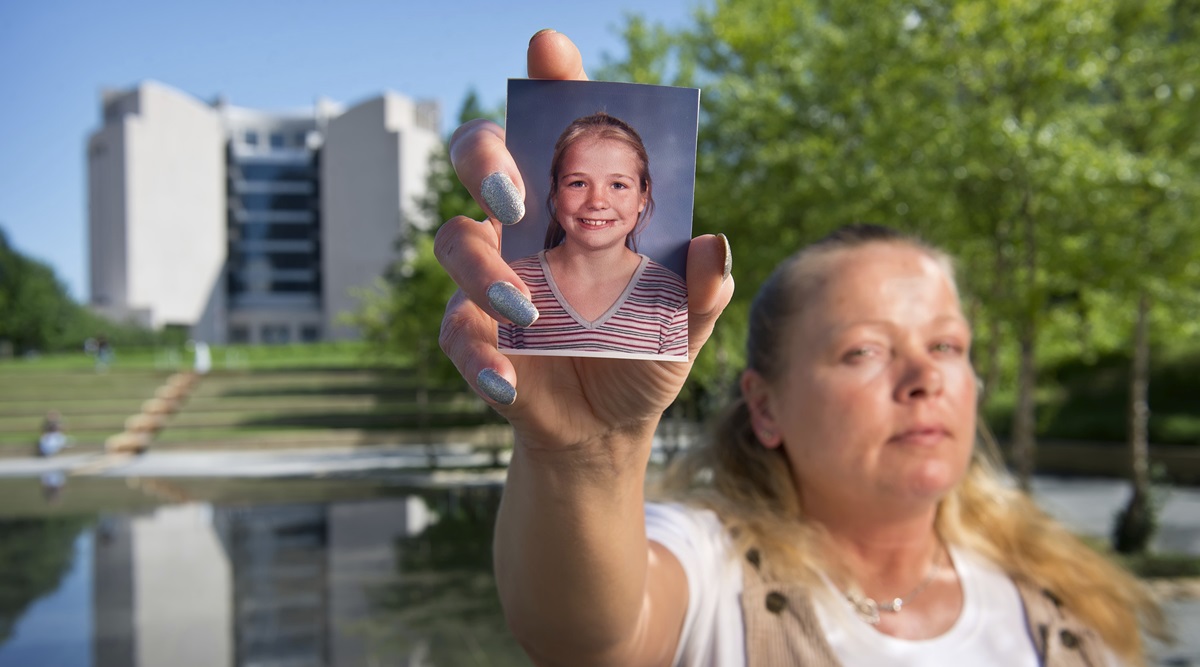
[ad_1]
 Sherri West, mother of Pamela Butler, holding a photo of her daughter at the Federal Courthouse in Kansas City, Mo. (David Eulitt/The Kansas City Star via AP)
Sherri West, mother of Pamela Butler, holding a photo of her daughter at the Federal Courthouse in Kansas City, Mo. (David Eulitt/The Kansas City Star via AP)
The US government executed Keith Nelson, a convicted child murderer, on Friday afternoon in its fifth execution since resuming capital punishment this summer after a 17-year hiatus and despite a ruling the lethal injections violated US drug laws.
Nelson, 45, was declared dead at 4:32 pm in the US Department of Justice’s execution chamber in Terre Haute, Indiana, after being injected with lethal doses of pentobarbital, a powerful barbiturate, the department said. It was the second execution this week after Lezmond Mitchell, another convicted murderer, was killed on Wednesday.
The administration of President Donald Trump, a vocal supporter of capital punishment for serious crimes, has now carried out more federal executions than took place in the preceding 57 years. Nelson was convicted of raping and murdering 10-year-old Pamela Butler in Kansas in 1999.
A Bureau of Prisons official asked Nelson if he had any last words. About 15 seconds passed with no response from Nelson before the official began the execution, according to a journalist selected by the department to witness the execution and share a report with news outlets. Nelson took about nine minutes to die.
His victim’s mother, Cherri West, said his death brought her some peace. “I wasn’t expecting him to say anything because he never had no remorse,” she said. “I have no remorse for him.”
On Thursday, a federal judge overseeing legal challenges to the execution protocol by Nelson and other death row inmates ruled that the Justice Department’s protocol violated drug safety laws. Judge Tanya Chutkan of the US District Court in Washington ordered Nelson’s execution be delayed until the Justice Department revised its protocol to comply with the Food, Drug, and Cosmetic Act, including a requirement that a drug can only be issued on a clinician’s prescription.
The Justice Department challenged the injunction delaying the execution in the US Appeals Court for the District of Columbia Circuit. The appeals court overturned the injunction on Thursday evening, ruling that Chutkan had not established that violations of the act constituted “irreparable harm.”
Chutkan spoke with lawyers representing Nelson and the Justice Department in a telephone conference on Friday as she considered a request by Nelson’s lawyers to revise her order or issue a new one blocking Friday’s execution.
Chutkan denied that request less than 90 minutes before Nelson’s scheduled execution time, writing that he had not “convincingly” shown irreparable injury.
Nelson was one of more than a dozen inmates on federal death row in Terre Haute who sued the Justice Department over its lethal injection protocol, which was announced in 2019, replacing the old three-drug protocol last used in 2003.
He is now the fourth of those plaintiffs to have since been executed by the Justice Department after the US Supreme Court swiftly dismissed earlier injunctions issued by Chutkan delaying the executions to allow the litigation to proceed.
Nelson’s attorneys Dale Baich and Jen Moreno said in a joint statement that the US execution system was flawed and that the government was “blatantly violating” drug laws.
“As this execution and the recent ones demonstrate, the death penalty is not about fairness and justice, it is arbitrary and political,” the statement said.
📣 The Indian Express is now on Telegram. Click here to join our channel (@indianexpress) and stay updated with the latest headlines
For all the latest World News, download Indian Express App.
[ad_2]
Source link